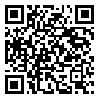Volume 14, Issue 1 (4-2014)
Iranian Journal of Medical Education 2014, 14(1): 64-77 |
Back to browse issues page
Download citation:
BibTeX | RIS | EndNote | Medlars | ProCite | Reference Manager | RefWorks
Send citation to:



BibTeX | RIS | EndNote | Medlars | ProCite | Reference Manager | RefWorks
Send citation to:
Karimi M. The Association between Personal Characteristics and Educational Experiences with Academic Achievement among Students of Shahid Sadoughi Medical University of Yazd. Iranian Journal of Medical Education 2014; 14 (1) :64-77
URL: http://ijme.mui.ac.ir/article-1-2880-en.html
URL: http://ijme.mui.ac.ir/article-1-2880-en.html
, marziyeh.karimi84@gmail.com
Abstract: (17981 Views)
Introduction: In spite of the significance of achievement actualization in the development of educational quality, little investigation has been done in this regard. University administrators have a minute knowledge about students’ achievement fulfillment and the factors influencing this issue. Therefore, this study was performed to investigate the association of personal characteristics and educational experiences of the students with their academic achievements.
Methods: This descriptive correlational study was conducted on the students of Shahid Sadoughi Medical University within 2011-2012 academic years. Students were selected through random stratified sampling based on gender and discipline (n=300). The research tool was the college students’ experiences questionnaire (CSEQ). Data was analyzed using descriptive statistics and multiple regression.
Results: All three dimensions of college students’ experiences including perceptions of quality of environment, quality of effort, and social integration are significant anticipators of their academic achievements respectively and predict 0.43 of achievements variance. In addition, students’ experiences inpredicting their academic achievement differ considering gender, major, and educational level it means that experience dimensions in male and female students predicted 0.38 and 0.31 of the achievement, respectively. Moreover, all dimensions of the experiences of health students predicted 0.31, allied health medicine students 0.38, nursing and midwifery students 0.43, medical students 0.22, and dental students 0.18 of achievement variance. The predictability rate for bachelors, masters, and graduate students were 0.45, 0.33, and 0.42, respectively.
Conclusion: Purposeful planning for promoting students' participation in on-campus activities as well as interaction with administratory personnel can affect students’ efforts and ground for fulfillment of their and non-intellectual achievements in an acceptable level. This not only can improve the efficacy of educational systems, but also helps students’ improvement regarding their educational objectives, individual promotion, and social and professional qualification
Keywords: Personal characteristics, educational experiences, academic achievements, medical university
Type of Study: Original research article |
Subject:
Educational Management
Received: 2013/09/8 | Accepted: 2014/01/15 | Published: 2014/03/18 | ePublished: 2014/03/18
Received: 2013/09/8 | Accepted: 2014/01/15 | Published: 2014/03/18 | ePublished: 2014/03/18
پرسشنامه مطالعه [PDF 186 KB] (491 Download)
Send email to the article author
| Rights and permissions | |
 |
This work is licensed under a Creative Commons Attribution-NonCommercial 4.0 International License. |




